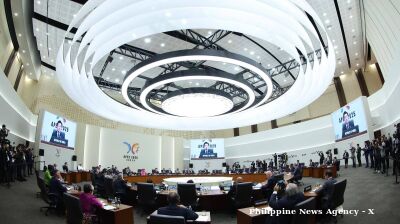COP28 host, the United Arab Emirates, has planned to use its status at the UN annual climate conference in Dubai to make new oil and gas deals, said the BBC.
The British broadcaster cited leaked briefing documents that indicate the UAE plans to use its position to talk about fossil fuels with as many as 15 member nations.
This comes as the world is heating fast, with this year the hottest on record.
According to the UN, fossil fuels – oil, gas and coal – are "by far” the largest contributor to global climate change, accounting for more than 75% of global greenhouse gas (GHG) emissions and nearly 90% of all CO2 emissions.
The UAE told the broadcaster, "private meetings are private" and declined to comment on the content of meetings.
“These allegations are false, not true, incorrect, and not accurate,” said COP28 president Sultan al-Jaber at a press conference in Dubai on Wednesday, 29 November. “And it’s an attempt to undermine the work of the COP28 presidency.”
The COP28 meeting begins November 30 in Dubai in the UAE, an economy driven by oil. The president of the UN conference al-Jaber is – controversially – also head of the UAE’s state oil giant, Abu Dhabi National Oil Company (ADNOC).
COP summits are the most important meetings globally for discussing how to tackle the climate crisis. As many as 167 world leaders will attend, including King Charles III, but not President Joe Biden of the US or President Xi Jinping of China.
The leaked documents were obtained by the Centre for Climate Reporting working with the BBC. They were prepared by the COP28 team of the UAE, which will meet with at least 27 foreign governments in advance of the climate summit.
The documents’ talking points include – for example – one for a planned meeting with China that says ADNOC was "willing to jointly evaluate international LNG [liquefied natural gas] opportunities" in Australia, Canada and Mozambique.
The leaked documents also suggest telling a government minister of Colombia that ADNOC "stands ready" to support the South American country to develop its oil and gas resources.
According to the BBC, the documents further indicate that talking points for 13 additional countries, such as Germany and Egypt, include telling them ADNOC is keen to work with their governments to develop fossil fuels.
The talking points were to include:
- Asking Brazil’s environment minister for aid "securing alignment and endorsement" for ADNOC’s bid for Latin America's largest oil-and-gas processing company, Braskem. Earlier in November, ADNOC made a $2.1bn offer to buy a key stake.
- Germany was to be told by ADNOC that "We stand ready to continue our LNG supplies."
- ADNOC suggested that the oil-producing nations of Saudi Arabia and Venezuela should be told that "there is no conflict between the sustainable development of any country's natural resources and its commitment to climate change."
The UAE’s state renewable-energy company, Masdar, will also be a subject in talks with 20 countries such as Brazil, China, Egypt, France, Germany, Kenya, the Netherlands, Saudi Arabia, the UK and the US. It recently emerged that Masdar is not as big as it claims to be.
Professor Michael Jacobs of Sheffield University in the UK, an expert on UN climate politics, told the BBC that the UAE’s COP28 team's actions appeared "breathtakingly hypocritical."
"I actually think it's worse than that because the UAE at the moment is the custodian of a United Nations process aimed at reducing global emissions," Jacobs added. "And yet, in the very same meetings where it's apparently trying to pursue that goal, it's actually trying to do side deals which will increase global emissions."
The United Nations Framework Convention on Climate Change (UNFCCC) told the BBC that the "cardinal principle" for COP presidents and their teams is the “obligation of impartiality." COP presidents are "expected to act without bias, prejudice, favouritism, caprice, self-interest, preference or deference, strictly based on sound, independent and fair judgement," it said.
News

US–China soybean sales restart
According to Scott Bessent, US Treasury Secretary, the agreement marks a significant step towards restoring normalcy for American farmers.

Russia faces $50bn annual losses from oil sanctions as Lukoil exits international assets
Russia is expected to lose at least $50bn annually due to oil-related sanctions, as Moscow’s largest private oil producer Lukoil agrees to sell its international assets and Germany considers nationalising operations owned by state-run Rosneft.

Chicken and chips in Seoul - for Nvidia, Samsung and Hyundai
In a low-key fried chicken shop in southern Seoul, the leaders of Nvidia, Samsung Electronics and Hyundai Motor held an informal meeting on the evening of October 30.

Presidents Lee and Xi begin diplomatic chapter at APEC summit
President Lee, who is chairing the first session of the summit at the Hwabaek International Convention Centre, stood at the entrance to personally welcome participants. President Xi reached the venue at approximately 10:02.




